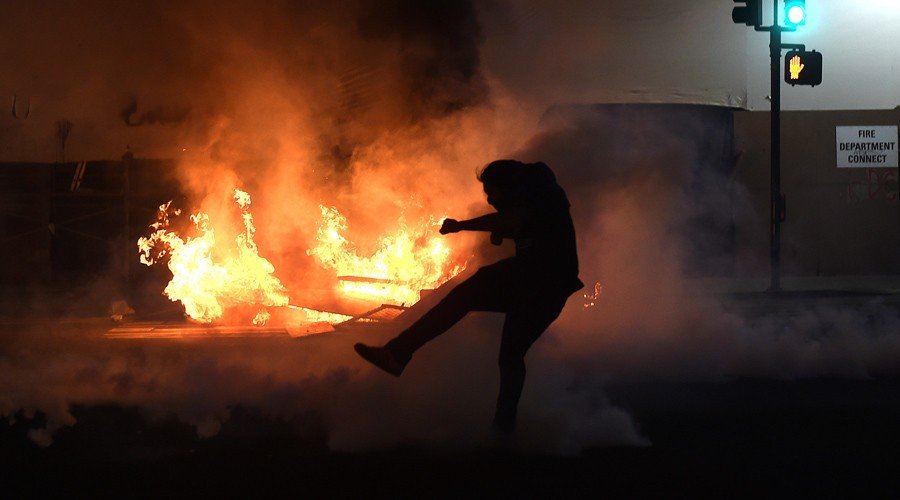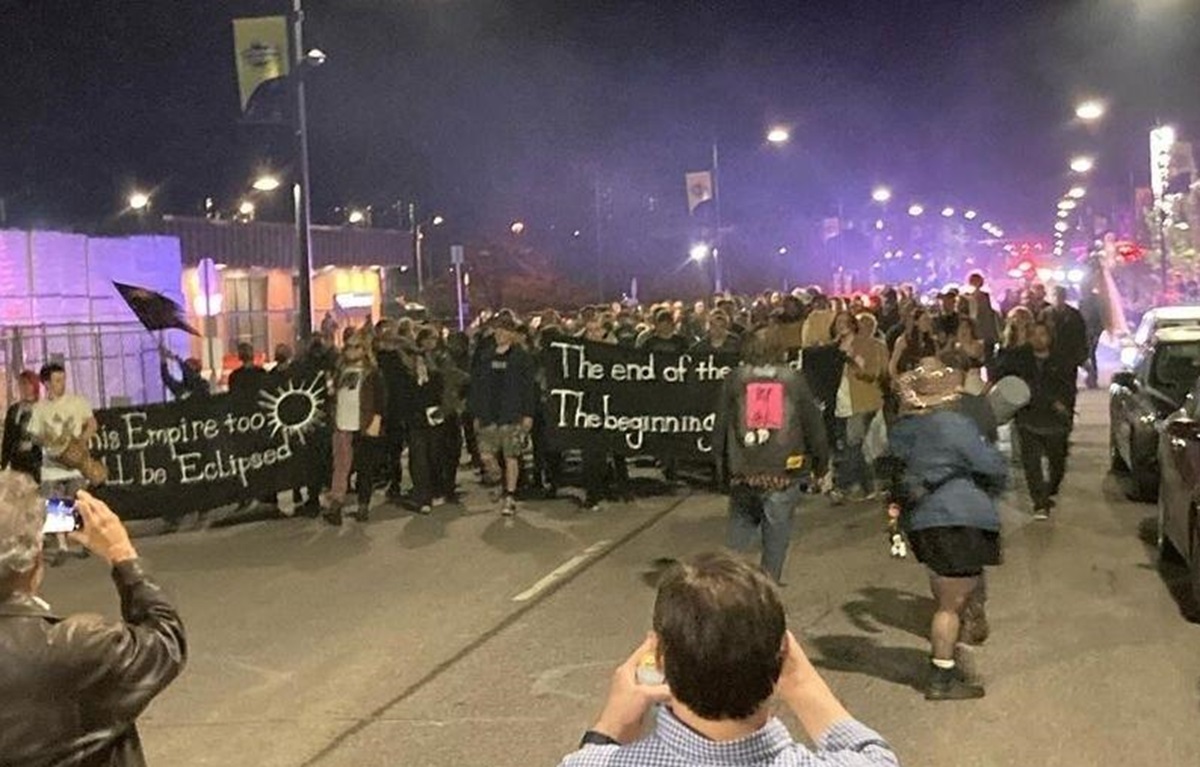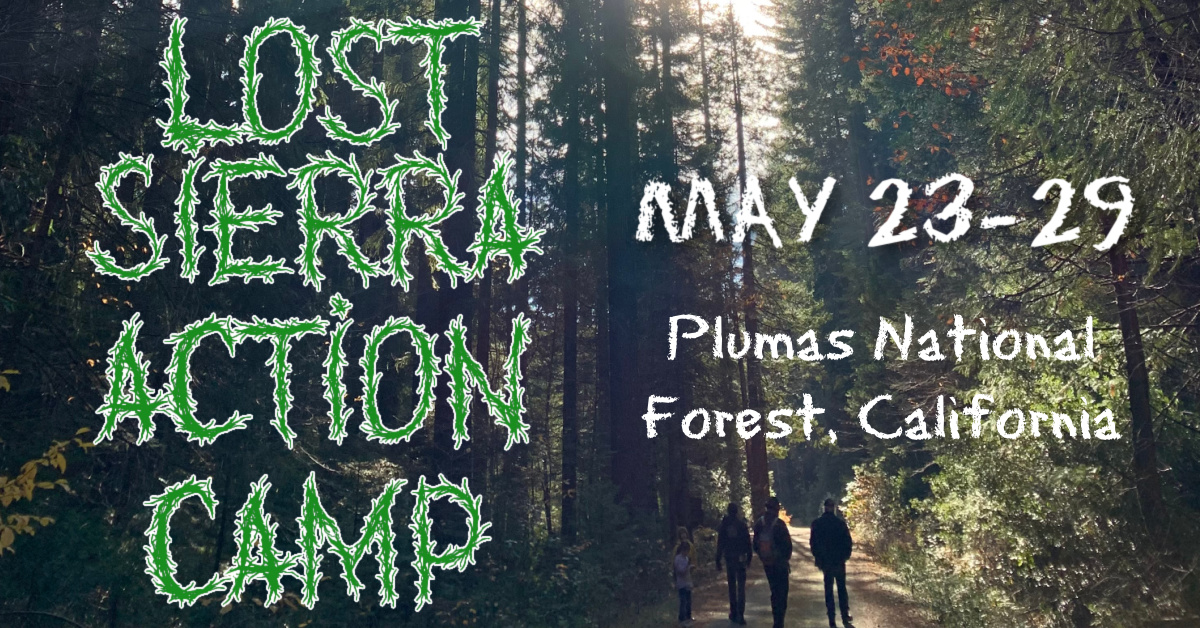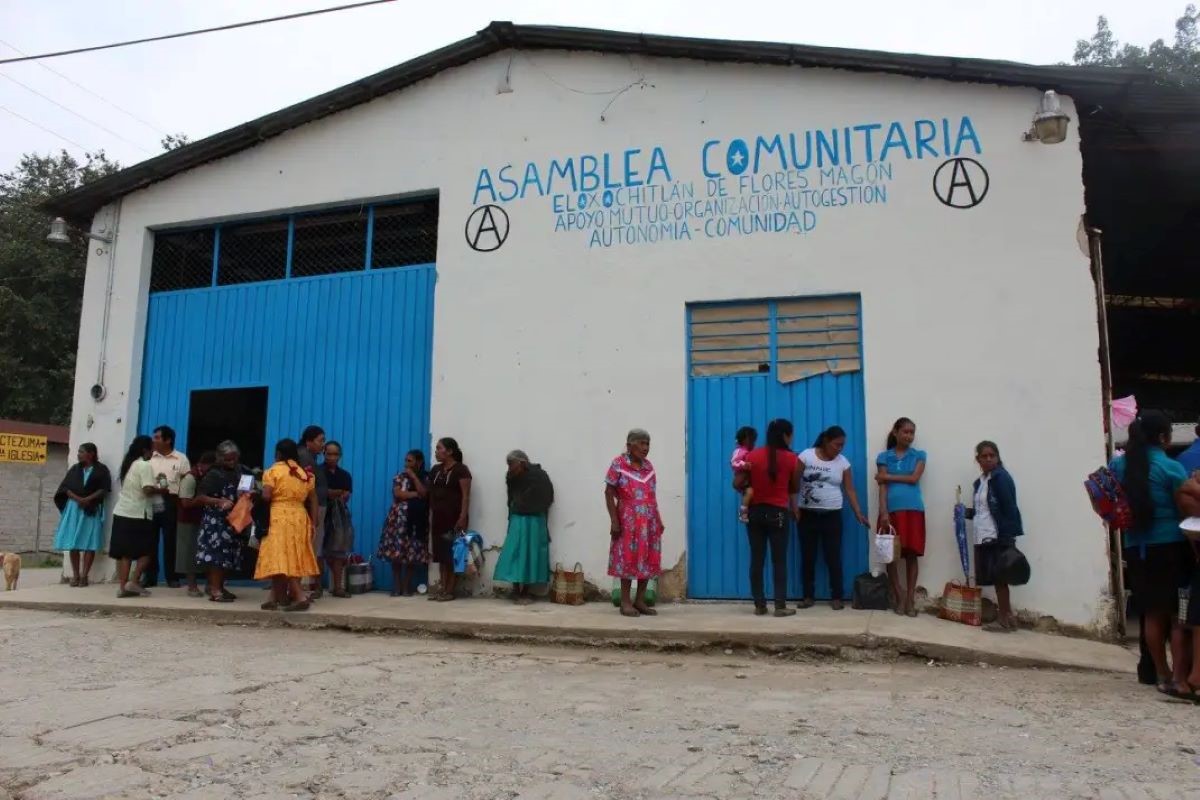Filed under: Analysis, The State, US

Submitted to It’s Going Down
WE ARE STILL REELING; reality feels disjointed, vertiginous. A fascist will run this country for at least the next four years. That distant shadow looming on the horizon was not so distant; it was just a trick of the light, or perhaps a media-induced fog that obscured it. When the fog lifted it was upon us already. In this way the onset of fascism is like climate change: the gradual rise of oceans seems to bear consequences only in some distant future, until the dikes break and flood waters rush in overnight. So, there is a sense of disorientation, and it might take us a moment to find our bearings in the rising waters.
But we cannot take too long. A racist, misogynist autocrat has control over the surveillance and policing apparatuses that have been built up over the past two decades, and he has a long list of enemies. Migrants and muslims, women and transfolk, queers and the poor will be targeted by government forces and newly energized neo-nazi thugs. Police will receive more weapons, more funding, and more legitimacy. Political enemies will be targeted. Times are dark. But wringing hands and professing shock is not enough; our task now is to be truly contemporary, to understand the new realities of the moment and not hold tight to empty myths. Remember, though, that fascism also relies on myth, and the myths of the fascists are equally fragile.
Liberal democracy is over
Liberal democracy has been dead for some time, but November 8, 2016 saw its most violent death throes. Its demise has been a long time coming. This is not to say that the election was not democratic—this is beside the point. What finally ruptured was the appearance of a general consensus that politics should take the form of rational debate, argumentation, and compromise; what broke was the Enlightenment-based conceit that we all share the same world, that we can have conversations across political difference and find solutions. Underneath this shredded veil, the ongoing truth of civil war emerges again: a variety of different worlds and forms of life, incompatible with each other.
It is not the first time that a fascist has been democratically elected. This is one of the problems with posing democracy contra fascism. Instead of automatically taking the side of “democracy” and joining in a popular front, we might conceive of this historical moment as a global war with three players. There is liberal democracy governed by a cybernetic neoliberalism, the regime that has managed the past four decades. There is reactionary populism governed by strong-man posturing. And there is a third, heterogeneous array of resistances, those struggling against police and prisons and pipelines. Liberal democracy has been dealt a blow, and the jackboots might soon hit the street. It is frightening, but liberal democracy was never that kind to us either.
There are some interesting elements to this. For all of his racist demagoguery, Rush Limbaugh pointed at some deeper truth when he denounced the use of “fact-checks” by media outlets: “It allows them to fool you into thinking they have an objective, nonpartisan staff or person analyzing everything the candidates are saying, and telling you what they’re saying is true, or what they’re saying is false.” His words echo Judith Butler’s discussion of truth: “Each society has its regime of truth, its “general politics” of truth: that is, the types of discourse which it accepts and makes function as true; the mechanisms and instances which enable one to distinguish true and false statements, the means by which each is sanctioned; the techniques and procedures accorded value in the acquisition of truth; the status of those who are charged with saying what counts as true.” While Trump has certainly mastered “post-truth politics,” we know that discourses of objectivity, science, and rationality have always contained political assumptions. Truth is never neutral. We should not be nostalgic for an era of democracy, rationality and science which depended on white supremacy and patriarchy. Instead, in the midst of civil war, we might begin to craft different worlds, with different regimes of truth.
A final note on social networks: since the election, pundits scrambling to explain their own ineptitude have pointed to the partisan echo chamber of social media. Algorithms determine what news we see, what political ads show up in our web browsers, which friends’ comments we see on Face – book. The confirmation bias is cybernetically enhanced: we see and hear facts that confirm what we want to believe, not simply because we ignore the rest but because it doesn’t show up at all. As usual, though, the pundits miss the point. What is most worrying is not the fracturing of incompatible worlds but the algorithms and the companies behind this sorting. The truth used to appear objective and universal, while in fact it was determined by scientists and political leaders and media outlets. Now, however, the truth is personalized, custom-tailored to meet our own expectations, and controlled by computer algorithms created by private corporations. Deleuze’s warning on societies of control remain important: what matters in mechanisms of control is not the instances of control that are affected (a particular advertisement shown or not shown) “but the computer that tracks each person’s position and effects a universal modulation.”
Progress is dead
McKenzie Wark describes this moment as the death of liberalism, and with it the death of progress. This, too, is not a bad thing. Economic progress has not generated the larger cake that we all split or new forms of jobs; Trump supporters recognize that there is no future for them in business as usual. As Wark says: “the old working class cannot be articulated to a progressive project, even a merely liberal one, because the growth and development of the economy will only push them (or their offspring) further into marginality.” It is not migrants and trade deals that are taking our jobs, of course, but automation and the general law of capitalist accumulation, but the problem remains. However the death of progress opens up other possible futures. Let us not forget all of the horrors visited on workers, deviants, black, brown and queer bodies and the environment in the name of “progress”. Colonization was “progress”; The Dakota Access Pipeline is “progress”; the TPP was “progress”; drone strikes on wedding parties and mass deportation of migrants under Obama’s administration were “progress”.
No popular front
I ended up in the streets of Oakland on the day after the election. It was the best place to be on that day, with such a strong culture of resistance to the racist & capitalist hell we inhabit. There were thousands of people, and a sense of strength and anger and conviction. I heard many things I agreed with: a frustration that white liberals only came out against Trump, when they have been content to sit by the sidelines during ongoing attacks on other communities; a commitment to build power in the streets and not in electoral politics; a willingness to connect Trump with the police, and to stand resolutely against both.
I had another encounter which felt so familiar that I couldn’t help but recall past struggles against fascists. As friends were chanting “no more presidents” A man came up to me, pleading. He wanted us to lay aside our differences and agree that none of us want a fascist president. “After we get him out, you can continue to fight for total freedom. But first, no fascist president!” I don’t know what he expected us to do, or how he expected to drive Trump out of office, but it could only result in some other political figure in power. The appeal to electoral politics has already begun, and once Democrats regain their footing we will start to hear urgent calls to organize for the 2018 and 2020 election cycles. I remember the Bush years, and the ways that global justice organizing turned into anti-war mass movement, which was then seamlessly integrated into Democratic electoral campaigns. We cannot let the same thing happen. The good news is that it seems less likely than ever; voter turnout hit a 20-year low this November. Trump was elected by a quarter of eligible voters. Only cynical politicians and true believers still keep faith in democracy.
Whatever happens on the national political level, the next four years will be catastrophic. We should expect to see reproductive care and health care gutted; a continued increase of white supremacist organizing and street violence; raids and attacks on immigrant communities; state targeting of Muslims and refugees, and more. And, of course, the catastrophes of late capitalism will continue; the financial crises are not over, the climate continues to warm with increasingly disastrous consequences. If there is hope, it lies in the expansion of existing struggles.
Living and fighting
And today, there are struggles all around us. The struggle against the construction of the Dakota Access Pipeline has brought more people together in more fierce resistance to capitalist infrastructure than anything else in the US in recent history. The camps there are worlds in their own right, worlds that, for all of their flaws and internal conflicts, are taking form against this one. The prison strike that took place in September was the largest organized action in US prisons in history; repression continues, but so does organizing, between prison rebels on the inside and accomplices on the outside.
The relationships built there have the potential to continue and grow. The anti-police movements of the past several years have set a new bar for resistance in this country; highway blockades, burning barricades, and looting are now on the table. And the protests that erupted after Trump’s election were unprecedented; no president has faced so much resistance before even taking office. People’s willingness to go toe-to-toe with the police, to eschew the politics of respectability in favor of confrontation and conviction, reveals their deeper understanding of the situation: there is no democratic remedy to Trump’s fascism, there is only the power we build, together.
This is not a power of organizations, of mobilizing masses, of membership lists and get-out-the-vote drives. It is a power of action, of choosing sides, getting organized, and sabotaging the fascist machine by any means necessary. It is the power of finding new spaces of encounter, of building friendships and relationships with others who will be targeted by the police and white supremacists. It is the power of blocking highways and burning pipeline construction equipment, but also the power of feeding each other, of inhabiting a territory, of building worlds capable of withstanding the collapse of this one. It is the power of disarming the police, not through policy, but through making it materially impossible for them to govern. It is the power of disrupting the surveillance apparatuses that Trump’s regime will attempt to use to control us. It is the power of networks built to survive ICE raids and to keep people out of detention centers, to confront white supremacists in the streets and to care for each other while we do it.
We cannot afford to wait until the next election cycle; we need to act now, carefully but decisively, to sabotage the mechanisms of policing and repression before they are further activated. Cops can’t patrol with fat tires; lists of Muslims and “criminal immigrants” won’t work if they’re polluted with false registrations or hacked. There are a million different ways to fight, but fight we must. There is no longer any point in struggling to control a system that is hostile to our existence; there is only the matter of elaborating our survival, creating a multiplicity of worlds that are all incompatible with fascism and capitalist disintegration. If we do it right, we might help one another survive not just Trump, but the ongoing disaster of this world.





